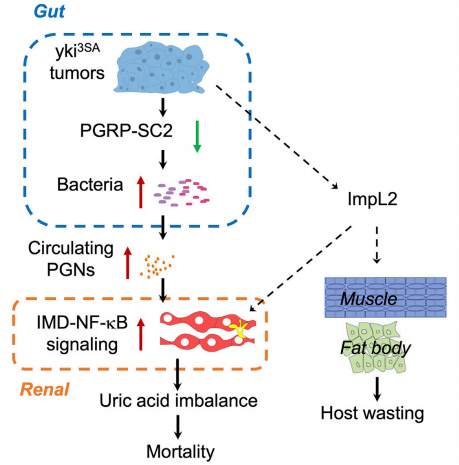IF=43.474!Immunity|宋威团队揭示癌症恶液质的致病机理:肠道-肾脏免疫轴和尿酸代谢
日期:2023-04-03 09:20:46
以往利用不同的小鼠肿瘤模型,研究人员发现恶性肿瘤可通过分泌蛋白,如IL-6、TNF-a、Activin A、LIF等,促进宿主消耗(Baracos et al., 2018)。然而这些研究通常在无特定病原微生物(SPF)条件下完成,因此忽视了环境中微生物如细菌、真菌、病毒等以及宿主免疫反应的作用。
利用果蝇恶液质模型,研究人员鉴定了一系列肿瘤分泌蛋白,如ImpL2、Pvf1和Upd3等,分别通过insulin、MEK和Jak/Stat信号通路来远程破坏宿主器官代谢平衡,造成宿主消耗(Ding et al., 2021; Kwon et al., 2015; Lodge et al., 2021; Song et al., 2019)。
2022年8月26日,武汉大学免疫与代谢前沿科学中心/中南医院医学研究院/泰康生命医学中心的宋威课题组在《Immunity》杂志上发表题为"Renal NF-kB activation impairs uric acid homeostasis to promote tumor-associated mortality independent of wasting"的研究论文。
3SA(人体YAP1同源物),诱导肠道干细胞过度增殖形成肠道恶性肿瘤。在该研究中,研究人员首先发现yki3SA果蝇体内细菌增殖和系统IMD-NF-κB活化,延长荷瘤果蝇的寿命。遗传学上回复肠道PGRP-SC2(在本研究中被鉴定为一种全新的具有广谱抗菌功能的分泌型酰胺酶)表达也可以在不影响肠道肿瘤的前提下抑制细菌增殖和IMD-NF-κB活化、延长果蝇寿命。
3SA果蝇马氏管中的IMD-NF-κB通路,而不是传统认为的肌肉、脂肪和大脑组织,可以有效缓解yki3SA荷瘤果蝇的马氏管中IMD-NF-κB活化可以造成尿酸堆积、促进机体死亡;喂食别嘌呤醇(Allopurinol)抑制尿酸合成或在马氏管中特异阻断IMD-NF-κB通路可有效缓解yki

总之,该研究发现环境微生物、肠道细菌、肾脏IMD-NF-κB免疫反应和尿酸代谢是恶性肿瘤导致机体死亡的重要因素,且独立于目前已知的肿瘤相关的机体消耗,为深入理解肿瘤-宿主互作、实现荷瘤生存提供了新的角度。
Argiles, J.M., Busquets, S., Stemmler, B., and Lopez-Soriano, F.J. (2014). Cancer cachexia: understanding the molecular basis. Nature reviews Cancer 14, 754-762.
Baracos, V.E., Martin, L., Korc, M., Guttridge, D.C., and Fearon, K.C.H. (2018). Cancer-associated cachexia. Nat Rev Dis Primers 4, 17105.
Cani, P.D. (2017). Gut microbiota - at the intersection of everything? Nat Rev Gastroenterol Hepatol 14, 321-322.
Ding, G., Xiang, X., Hu, Y., Xiao, G., Chen, Y., Binari, R., Comjean, A., Li, J., Rushworth, E., Fu, Z., et al. (2021). Coordination of tumor growth and host wasting by tumor-derived Upd3. Cell reports 36.
Figueroa-Clarevega, A., and Bilder, D. (2015). Malignant Drosophila tumors interrupt insulin signaling to induce cachexia-like wasting. Dev Cell 33, 47-55.
Kwon, Y., Song, W., Droujinine, Ilia A., Hu, Y., Asara, John M., and Perrimon, N. (2015). Systemic Organ Wasting Induced by Localized Expression of the Secreted Insulin/IGF Antagonist ImpL2. Developmental Cell 33, 36-46.
Lodge, W., Zavortink, M., Golenkina, S., Froldi, F., Dark, C., Cheung, S., Parker, B.L., Blazev, R., Bakopoulos, D., Christie, E.L., et al. (2021). Tumor-derived MMPs regulate cachexia in a Drosophila cancer model. Dev Cell 56, 2664-2680 e2666.
Lok, C. (2015). Cachexia: The last illness. Nature 528, 182-183.
Shin, H.S., Lee, H.R., Lee, D.C., Shim, J.Y., Cho, K.H., and Suh, S.Y. (2006). Uric acid as a prognostic factor for survival time: a prospective cohort study of terminally ill cancer patients. J Pain Symptom Manage 31, 493-501.
Song, W., Kir, S., Hong, S., Hu, Y., Wang, X., Binari, R., Tang, H.W., Chung, V., Banks, A.S., Spiegelman, B., et al. (2019). Tumor-Derived Ligands Trigger Tumor Growth and Host Wasting via Differential MEK Activation. Dev Cell 48, 277-286 e276.
Strasak, A.M., Rapp, K., Hilbe, W., Oberaigner, W., Ruttmann, E., Concin, H., Diem, G., Pfeiffer, K.P., Ulmer, H., Vhm, et al. (2007). Serum uric acid and risk of cancer mortality in a large prospective male cohort. Cancer Causes Control 18, 1021-1029.
科研的每一小步成功都来源于团队背后十二分的努力。
我们为用户的成功感到由衷的喜悦!——小酷
—END—











